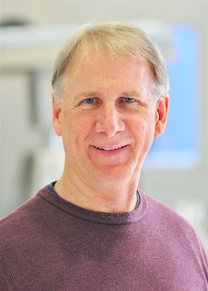Investigator Spotlight: November 2014

Richard Lloyd, PhD
Dr. Lloyd is a professor at the Baylor College of Medicine. Dr. Lloyd joined nPOD in 2011.
- Tell us about your education and background – where are you from, where did you go to school?
I was raised in Maryland and educated at the University of Maryland, Colorado State University and the University of Texas Medical Branch in Galveston, where I received my PhD. I was trained in microbiology and molecular virology. - Where do you currently work and what is your position? What does a “day in the life” look like for you?
I am currently Professor of Molecular Virology and Microbiology at Baylor College of Medicine in Houston, TX. - Why diabetes? How did you get involved in diabetes and/or what made you want to work in diabetes research?
I became involved in diabetes research only recently. We have a cutting edge microbiome research center here at BCM and its director Joe Petrosino was looking for new projects. I suggested to Dr. Petrosino that Type 1 Diabetes (T1D) might be a good topic to bring to microbiome/virome analysis for the first time. I knew that questions surrounding a viral trigger or cause for the disease had swirled for some time, and that evidence was accumulating to support that hypothesis, but that the current T1D research community was unable to pin it down and prove the association and mechanistic linkage. I have always been involved in basic molecular virology research so I thought that our combined expertise would be something the T1D community might welcome. We have found that to be very true in the two years since. -
Tell us about your research.
Historically my research has always involved basic research into interactions of enteroviruses such as poliovirus and coxsackievirus B3 with cells. The viruses most commonly implicated with T1D are Type B enteroviruses, which include coxsackievirus B. We have determined how enteroviruses take over many functions in the infected cell, how it controls the proteins the cell can make and more recently, how viruses manipulate stress responses and control the inherent antiviral defenses in cells. We are eager to bring our expertise into the T1D field. I am now involved with the “Virus Working Group”, an amazing consortium of international scientists that have assembled within nPOD, with the goal of definitively finding which viruses may trigger T1D. My specific role at the outset is to try to grow, amplify and recover live viruses out of nPOD samples and to determine how many nPOD cases may harbor live viruses in their pancreatic or spleen tissues. We will identify these viruses by deep sequencing with Dr. Petrosino’s group, but also, if they turn out to be enteroviruses, we will delve into the molecular mechanisms of how they grow in human pancreas cells (which is poorly understood) and test several mechanisms about how such virus infections could trigger autoimmunity. These latter studies are crucial because vaccine companies are unlikely to invest hundreds of millions of dollars to develop an enterovirus vaccine to prevent T1D unless the molecular mechanisms of viral triggering of autoimmunity are known. - What are your thoughts on the progress being made in T1D research as a whole?
The initial work of the nPOD-V group has strengthened, not weakened, the association between enteroviruses and T1D. The large international consortium is now organized and functioning as a group working very well and results with analyses of nPOD tissues are begining to come in relatively quickly. Though I have been in this research field only a very short time I think the work that will be done in the next few years will be very telling.
-
Why is diabetes research so important?
This is a life-changing and debilitating disease of great consequence for millions of people. It is gratifying to participate in a process that may ultimately prevent this terrible disease. -
Do you have anything extra you would like to share? Is there anyone to thank or acknowledge?
We have been very grateful to the nPOD directors and JDRF officials who have quite openly welcomed me into this research field and provided enthusiastic support. - When you’re not working, what do you like to do for fun?
A great evening for me is playing music with a couple of local blues and rock bands that I am a member of.